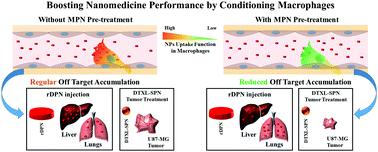当前位置:
X-MOL 学术
›
Mater. Horiz.
›
论文详情
Our official English website, www.x-mol.net, welcomes your
feedback! (Note: you will need to create a separate account there.)
Boosting nanomedicine performance by conditioning macrophages with methyl palmitate nanoparticles
Materials Horizons ( IF 12.2 ) Pub Date : 2021-07-29 , DOI: 10.1039/d1mh00937k Roberto Palomba 1 , Martina di Francesco 1 , Valentina di Francesco 1, 2 , Federica Piccardi 3 , Tiziano Catelani 4 , Miguel Ferreira 1 , Anna Lisa Palange 1 , Paolo Decuzzi 1
Materials Horizons ( IF 12.2 ) Pub Date : 2021-07-29 , DOI: 10.1039/d1mh00937k Roberto Palomba 1 , Martina di Francesco 1 , Valentina di Francesco 1, 2 , Federica Piccardi 3 , Tiziano Catelani 4 , Miguel Ferreira 1 , Anna Lisa Palange 1 , Paolo Decuzzi 1
Affiliation

|
Surface PEGylation, biological camouflage, shape and stiffness modulation of nanoparticles as well as liver blockade and macrophage depletion have all improved the blood longevity of nanomedicines. Yet, the mononuclear phagocytic system still recognizes, sequesters, and processes the majority of blood borne particles. Here, the natural fatty acid methyl palmitate is combined with endogenous blood components – albumin – realizing ∼200 nm stable, spherical nanoparticles (MPN) capable of inducing a transient and reversible state of dormancy into macrophages. In primary bone marrow derived monocytes (BMDM), the rate of internalization of 5 different particles, ranging in size from 200 up to 2000 nm, with spherical and discoidal shapes, and made out of lipids and polymers, was almost totally inhibited after an overnight pre-treatment with 0.5 mM MPN. Microscopy analyses revealed that MPN reversibly reduced the extension and branching complexity of the microtubule network in BMDM, thus altering membrane bulging and motility. In immunocompetent mice, a 4 h pre-treatment with MPN was sufficient to redirect 2000 nm rigid particles from the liver to the lungs realizing a lung-to-liver accumulation ratio larger than 2. Also, in mice bearing U87-MG tumor masses, a 4 h pre-treatment with MPN enhanced the therapeutic efficacy of docetaxel-loaded nanoparticles significantly inhibiting tumor growth. The natural liver sequestering function was fully recovered overnight. This data would suggest that MPN pre-treatment could transiently and reversibly inhibit non-specific particle sequestration, thus redirecting nanomedicines towards their specific target tissue while boosting their anti-cancer efficacy and imaging capacity.
中文翻译:

通过用棕榈酸甲酯纳米粒子调理巨噬细胞来提高纳米药物的性能
表面聚乙二醇化、生物伪装、纳米颗粒的形状和刚度调节以及肝脏阻断和巨噬细胞耗竭都提高了纳米药物的血液寿命。然而,单核吞噬系统仍能识别、隔离和处理大部分血源性颗粒。在这里,天然脂肪酸棕榈酸甲酯与内源性血液成分(白蛋白)结合,实现了约 200 nm 的稳定球形纳米颗粒(MPN),能够诱导巨噬细胞进入瞬时和可逆的休眠状态。在原代骨髓衍生的单核细胞 (BMDM) 中,5 种不同颗粒的内化速率,尺寸从 200 到 2000 nm,具有球形和盘状形状,由脂质和聚合物制成,在过夜后几乎完全被抑制用 0.5 mM MPN 进行预处理。显微镜分析显示,MPN 可逆地降低了 BMDM 中微管网络的延伸和分支复杂性,从而改变了膜的膨胀和运动性。在免疫功能正常的小鼠中,用 MPN 预处理 4 小时足以将 2000 nm 刚性颗粒从肝脏重新定向到肺部,从而实现大于 2 的肺与肝脏蓄积比。此外,在携带 U87-MG 肿瘤块的小鼠中, a 用 MPN 预处理 4 小时增强了负载多西紫杉醇的纳米颗粒显着抑制肿瘤生长的治疗效果。一夜之间,天然的肝功能完全恢复。该数据表明 MPN 预处理可以瞬时和可逆地抑制非特异性颗粒隔离,
更新日期:2021-07-29
中文翻译:

通过用棕榈酸甲酯纳米粒子调理巨噬细胞来提高纳米药物的性能
表面聚乙二醇化、生物伪装、纳米颗粒的形状和刚度调节以及肝脏阻断和巨噬细胞耗竭都提高了纳米药物的血液寿命。然而,单核吞噬系统仍能识别、隔离和处理大部分血源性颗粒。在这里,天然脂肪酸棕榈酸甲酯与内源性血液成分(白蛋白)结合,实现了约 200 nm 的稳定球形纳米颗粒(MPN),能够诱导巨噬细胞进入瞬时和可逆的休眠状态。在原代骨髓衍生的单核细胞 (BMDM) 中,5 种不同颗粒的内化速率,尺寸从 200 到 2000 nm,具有球形和盘状形状,由脂质和聚合物制成,在过夜后几乎完全被抑制用 0.5 mM MPN 进行预处理。显微镜分析显示,MPN 可逆地降低了 BMDM 中微管网络的延伸和分支复杂性,从而改变了膜的膨胀和运动性。在免疫功能正常的小鼠中,用 MPN 预处理 4 小时足以将 2000 nm 刚性颗粒从肝脏重新定向到肺部,从而实现大于 2 的肺与肝脏蓄积比。此外,在携带 U87-MG 肿瘤块的小鼠中, a 用 MPN 预处理 4 小时增强了负载多西紫杉醇的纳米颗粒显着抑制肿瘤生长的治疗效果。一夜之间,天然的肝功能完全恢复。该数据表明 MPN 预处理可以瞬时和可逆地抑制非特异性颗粒隔离,











































 京公网安备 11010802027423号
京公网安备 11010802027423号